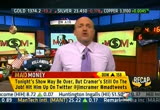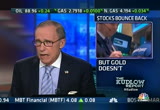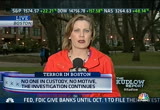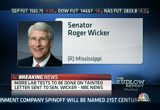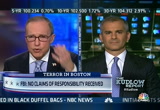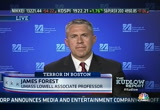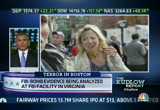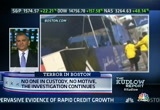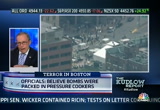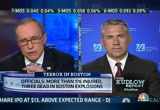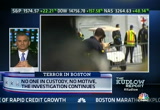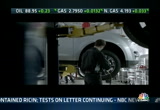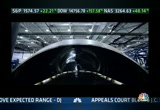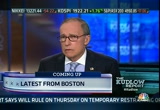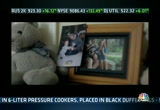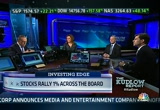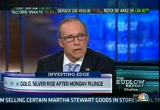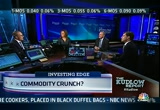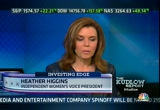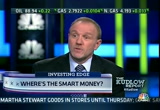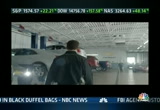tv The Kudlow Report CNBC April 16, 2013 7:00pm-8:01pm EDT
7:00 pm
it took two, j & j and coke. i like to say there is always a bull market somewhere, and i promise to try it find it just for you right here on "mad money." i'm jim cramer and i will see you tomorrow. good evening, everyone. i'm larry kudlow. this is "the kudlow report." another day has passed but we have very few solid answers about the boston marathon bombing. we do now know what kind of devices were used. after that, the new information is few and far between. we are going to go to boston for a live update. the stock markets had a very solid bounce back today after yesterday's big selloff. gold also had a positive day. but i believe the plunge in gold is a very good sign for the economy, just as it was in the '80s and '90s. in other words, some optimism. and senator marco rubio unveils the new immigration reform bill today. here's the key point. when we look at the benefits and score them dynamically,
7:01 pm
immigration reform will be a huge boost to the economy. "the kudlow report" begins right now. first up tonight, president obama will travel to boston thursday for an interfaith service with bombing victims. more than 24 hours after two bombs ripped through marathon crowds killing three, wounding 170 others, investigators are still no closer to answers. late this afternoon, the fbi said no claims of responsibility have been received, and the search for suspects is wide open. deborah boxdy joins us now from boston with all of the latest. good evening, deborah. >> reporter: good evening, larry. i'm live here along boylston street in the heart of boston, about four blocks or so away from the marathon's finish line, where those two bombs exploded just one day ago. security around the city remains
7:02 pm
extremely tight, as people try to move on after that devastating attack. three people died, including 8-year-old martin richard of dorchester, massachusetts. more than 170 others were hurt. some of them losing limbs. earlier today, authorities began processing that crime scene, which now stretches about 12 city blocks. they detailed some of the evidence found at the scene during an evening news conference. >> among items partially recovered are pieces of black nylon, which could be from a backpack, and what appear to be fragments of bee-bees and nails, possible contained in a pressure cooker device. we are expediting this blast evidence to our laboratory in quantico, virginia for a complete and thorough analysis. >> reporter: and authorities say they have received some 2,000 tips from the public about this case. they're also encouraging others to come forward, especially people who have seen someone
7:03 pm
with a suspicious backpack or people who have heard someone talking about targeting that marathon as they say someone knows something about who is to blame. reporting live in boston, now back to you. >> all right, deborah, thanks very much. we're going to get back to you later in the show. but we have some breaking news from washington right now. let's get right to hampton piers pierson. good evening. >> reporter: good evening, larry. the office of mississippi senator roger whitacre has informed associates about tainted letters intercepted at a u.s. postal facility and the fbi in baltimore confirming that a postal handling facility in landover, maryland tested a substance and determined it was the poison ricen. no one was exposed to the substance, we're told. wicker senate colleagues learned about the incident during a closed-door briefing on what happened in boston yesterday. senators now telling their staff to be on the alert, as well. senator claire mccaskill commenting after the briefing, confirming that basically an
7:04 pm
offsight screening process detected the letter and the substance. senator mccaskill saying in this case the system worked. and we'll have more on this larry, as the story continues to unfold. >> many thanks, hampton pearson from washington, d.c. with us tonight is nbc news terrorism expert and former director of the national counterterrorism center, that being michael lighter. also with us, the former director of terrorism studies at the u.s. military academy, associate professor james forest of u-mass lowell. and with me as co host, heather higgins, president and ceo of independent women's voice. mr. michael lighter, let me go back to the characteristics of the bomb, pressure cooker, kitchen timing device. ball bearings, bee-bees, nails, shrapnel. does this have the markings of a taliban attack, a pakistani, afghanistan attack, or am i mistaken? >> well, it is a very similar
7:05 pm
bomb structure that was used in times square in 2010. but i actually don't think that's the right thing to conclude right now. that's not the standard sort of explosives that the taliban has used in the past. and the pakistani taliban in this case has already denied responsibility for it. something -- i think they wouldn't have done had they ton it. so this helps give us some i said occasion of how sophisticated the bomb was. but i don't think it tells us all that much yet about who the bomber was. >> james forest, we don't know who the bomber was. we haven't had any communication. how odd do you think that is? >> well, we've seen attacks before where it's been two or three days before there's been any claim of responsibility. so i think it might be too hasty to rush to judgment on that. >> what do you mean, rush to judgment? you think communication might be coming? >> i think there could be some communication, or -- there are other ways finding out who the responsible party is. there is confessions, there s you know, going to be some leads followed up on. and i actually think that some
7:06 pm
of these photos people are turning over to the fbi are going to reveal some very good evidence. >> you know, michael lighter, that's such a key point. we talked about this last evening, near the grandstand, near the finish line. these bombs were left around, not in trash cans, as it turns out. left around in backpacks just put on the ground. but it just seems odd, they had -- police had swept the whole course once, and then an hour before the finish line, they swept it again. and still came up with nothing. how do you read that? what does that mean? how many people were circulating that put these deadly backpacks down on the ground? >> i think that everything we've heard means that it could still have been one person or it could be a group. it's possible that a sweep missed it. but my guess would be at this point the more likely outcome is that it was placed after the sweeps were actually occurred. so someone walking in the crowd, places those quickly. and an important note from what the fbi reported today, larry.
7:07 pm
the identity -- the identification of black back backs or bags, that is going to be useful information as they review the photographic evidence they get from cell phones and other cameras there at the scene. >> is that because it narrows down what they have to look at? >> that's exactly right. it's awfully hard to say what's suspicious until you have a better sense of what really is suspicious. so this will help them get through that material and find what's important. >> i just wanted to pursue your observation that this wasn't really an al qaeda type bomb. wasn't there a memo from them in 2003, precisely on how to build essentially a home made bomb using pressure cookers and nails and that was deployed in india and pakistan? >> it has been used before. and al qaeda has talked about that. but it's also a widely available bomb-making instructions on the internet. and it's been used by nonal qaeda groups, as well. i certainly don't want to rule out an al qaeda-inspired plot here. i just don't think that it points enough in that direction that we should rule out the
7:08 pm
other possibilities of some sort of domestic terrorism. >> mr. forest, the boston police have labeled this the most complex crime boston has ever had. why is that? how do you read that? what are they telling us? >> well, the scene is simply massive, a 12 block square area with cars. so it's taking them a long time to collect the data they need, the proverbial dots so they can look at all of those dots, all of that video, all of the physical evidence, all of the intelligence reporting, and start to slowly piece that together. it's an enormous task which is still going to take really days, not just hours. >> mr. lighter, can i just come back to this finish line? there was a grandstand. you had to have identification cards. the police swept that area an hour before the runners are expected to finish. so the bombers were there. okay? won't the surveillance cameras eventually reveal all this?
7:09 pm
won't that happen, maybe that's already happening? >> i think that really is one of the best leads that they have right now. everything in our world today is under video surveillance, and photographic surveillance. so even if one of the surveillance cameras didn't catch it, people are snapping pictures that entire time. and that's why officials have asked for this. it will take time to get through it. but i think there's a very high likelihood that the bomber or bombers will have been captured on this videotape. >> and mr. forest, let me come back to you on this. the complexity of this case has been simplified. we know about these black backpacks and so forth. how many people in all honest -- owe i know this is sheer, raw speculation. but to pull this off, we know there were two bombs 150 yards apart, if i'm not mistaken. do you think it was two people, do you think it was three people? in your experience, what would the size of the gang be like? >> well, if it was one person, he or she not only followed very good trade craft in designing
7:10 pm
and placing the bombs, but also chose the location of these targets very carefully. he or she knew where the cameras would be pointed at to get the most maximum media amplification of this kind of attack. we captured it going off at the right time. the videos have obviously gone all over the internet. and that's sort of a characteristic of a lot of the al-qaeda tax, where they really shoot for media amplification of these kinds of things. >> i guess what i'm asking, i know it's a difficult question, as probably unanswerable at this point. is it possible, in your judgment, from your experience, and your studies, that only one person did this? >> possible, but not so likely. >> mr. lighter, can you answer that one too? >> i'd say absolutely possible. >> absolutely possible. gentlemen, thank you very much. michael lighter, james forest, we appreciate it. and reminder to our viewers, we are monitoring the situation in boston. we'll break in with any significant break-in news throughout the program. but up next, we're going to
7:11 pm
switch gears a little bit. i say plunging gold is a good signal for the economy. just as it was in the '80s and the '90s. & there is no end of the world scenario out there. but my friend peter schiff disagrees. he's going to make his case ahead. don't forget, folks, free market capitalism always the best path to prosperity. i think that might include a gold-backed dollar. i'm kudlow. we'll be right back. [ male announcer ] when gloria and her financial advisor
7:12 pm
made a retirement plan, they considered all her assets, even those held elsewhere, giving her the confidence to pursue all her goals. when you want a financial advisor who sees the whole picture, turn to us. wells fargo advisors. all stations come over to mission a for a final go. this is for real this time. step seven point two one two. verify and lock. command is locked. five seconds. three, two, one. standing by for capture. the most innovative software on the planet...
7:14 pm
so we know gold has plunged about 25% from its peak in the middle of 2011. and it got crushed in recent days. i say that's a good omen for the economy. the dollar and even the stock market. i like the sinking gold. look there is no end of the world scenario. there is no end of the world dollar. there is no end to the euro. there is no inflation. and energy independence could curb our trade deficit, bolstering king dollar and bring gold down even more. remember the fabulous stock market and economic prosperity of the '80s and '90s? remember? gold was crushed then. maybe we're moving in that direction right now. think of it. anyway, here to debate, dave goldman, former head of fixed income research at bank of
7:15 pm
america. he's currently president of macro strategy. and we welcome back peter schiff, ceo of euro pacific capital and author of "the real crash," how to save yourself and your country. anyway, let me go right to peter schiff. peter, you probably don't agree with my prognostication that falling gold is, a., a good thing. and there is more of it. so tell me where you come out. >> well, first of all, larry, thanks for having me back on. it's been a while. and by the way, i read your piece on the fall on the gold price and while i agree with your sentiments, i completely disagree with your conclusion. when the price of gold did plunge in 1980, that was a good sign. because paul volcker did the right thing. but ben bernanke is no paul volcker. i know paul volcker. he may not be a personal friend of mine, but i have met him. and bernanke is not paul volcker. everything he has done since the 2008 financial crisis has simply made the situation worse. and president obama is no ronald reagan.
7:16 pm
it's not a repeat of 2008. maybe it's a repeat of 1980, rather. it might be a repeat of 1976 or more recently, 2008 when gold did go down by 35%. but it was a buying opportunity. and i think this decline will prove to be a better buying opportunity. >> appreciate that. dave goldman, you heard peter schiff. how do you react to that? >> i think the key issue here is that gold is not an investment but an insurance policy against the collapse of the dollar. when your cost of insurance goes down, it means you're healthier. the chicken little scenario, larry, we run trillion-dollar deficits, borrow half from foreigners, they'll stop lending us money or at least not at low rates and we'll crash. now, that's not going to happen. because of the energy boom, we're going to have the first trade surplus in a generation by 2020, as things are going. and that means we can finance things deficits as far as the eye can see. doesn't mean the economy isn't
7:17 pm
weak. we will have a deficit. the good news is, our credit is going to be good. the rest will keep lending us money at low interest rates and that's a big plus for the stock market. >> peter schiff, an interesting take that david goldman has used and i've given him a hat tip for it. energy independence, we don't have to import from the saudis other other people, the trade baume' go into surplus. that would be good for the dollar and that in turn would really crush gold. that's a strong dollar, not the volcker way, peter, as you pointed out. but through this energy story. >> well, first of all, you know, the dollar traded at a six-week low today versus other fee at currencies and we still have $500 billion a year trade deficit. so i don't think we're going to resolve that simply with the extra energy production. you know, it feels pretty good right now. the fed is spiking the punch bowl with all this monetary alcohol. but the problem is, when the hangover wears off, we're not going to be able to convince the world to keep lending us money at ultra-low interest rates.
7:18 pm
rates are going to go up. and when that happens, the party is over. because the economy, which is so strung out on cheap money, cannot afford higher interest rates. that's why all this talk about tightening is a bluff. >> peter, for 20 years, people have been saying the japanese government bond market would crash, but japan has a trade surplus every year, keeps financing its debt with a ten-year half a percent. as long as you've got a trade surplus, your credit is good, and you can keep financing it. that's what the japanese case tells us. doesn't mean we have a boom. but it means we don't have to insure ourselves against that crashing downsize -- >> but we don't have a surplus. i don't understand your point. we have the exact opposite. we have a massive deficit. >> well, we had a 6% of gdp deficit in 2006. it's now 3% of gdp. and if some of the economists' projections are correct, we go into surplus by 2020. that's what the market thinks. it could go wrong and i wouldn't sell all my gold at this point.
7:19 pm
but the way the market is going, we are likely to have a trade surplus or at least a deminimus deficit and that means our international credit is going to be terrific and there is no dollar crash. >> peter schiff, let me just ask you. look, there has been an awful lot of pessimism and i've been a credit of ben bernanke. and it's interesting to me and i want to get your reaction. the big inflation never came. the total collapse of the dollar never came. in fact, the dollar, against broad trade-weighted indexes is about what it was four or five years ago. gone up and down, hasn't really moved. this pumping of the money supply, most of the banks didn't use the reserves. and the inflation rate, heck, today, i think the year on year cpi, 1.3%. in other words, a lot of the doom and gloom collapsed the dollar, collapsed the euro, soaring american inflation. therefore collapse of the dollar and collapse of the american system. it just seems like, peter, that kind of pessimism and catastrophic pessimism never really happened, and now gold has completely lost its leg, because it traded on that
7:20 pm
catastrophic pessimism. >> well, you know, it hasn't happened yet. but i think it's premature to say that it's not going to happen. if you remember, gold actually performed better before the 2008 financial crisis. than it did after the 2008 financial crisis. it's all about the money prohibiting. the money printing is going to continue. the inflation is there, it's there in assets now, in the bond market, in the stock market, it's back in the real estate market. the money is being printed. that is a definition of inflation. we are expanding the money supply. i don't care what the government claims with their doctored-up cpi numbers. prices are rising. everybody who shops knows that. eventually you'll see higher increases in consumer prices. the government isn't going to be able to hide that with a cpi and the fed is going to be in a box. it's going to have to raise interest rates or admit they can't. but one way or another, we're going to have this dollar crisis. it's not a question of if. it's a question of when. >> all right. i hear you. i know that's your point of view. and i respect your point of view. all i'm saying is, i've heard this story for several years.
7:21 pm
i myself have occasionally participated in the inflation story. and frankly, i've been wrong. i was wrong again today with the cpi. dave, let me ask you -- >> not wrong. >> david, gold, 1350, 1370 today after the streak breakdown. is gold going to $100 or $1,000 or $2 how? i'll give you that range. $1,000 or $2,000? which is more likely, dave? >> more likely $1,000, which is roughly the marginal cost of production. $2,000, if the federal reserve slips up or we have a middle east war or ten other things that could go wrong. you don't sell off your insurance policy. but you don't look at gold as an investment. as for the inflation story, larry, who do you know who wants to take cash out of the bank and own hard assets? own brick and mortar? factories, commodities. people are still hoarding cash. we're still in a global did he leveraging. so the inflation story makes no more sense now than it did in
7:22 pm
japan for a long time. >> i think you're right. i've got to tell you my bias. there is so much risk avoidance by companies, by individuals, by banks. there is so much deleveraging going on that what bernanke does is being swallowed up by people who are cash-hungry. and the gold argument which might have had merit years ago doesn't seem to have merit anymore. peter schiff, i hear you, i understand your point of view. i appreciate you coming on. detailed goldman -- >> larry -- >> last one. go ahead. >> gold may very well go to 1,000 and $2,000. but if it goes to $1,000 first, you better buy it, because it will go to $2,000 afterwards and beyond. >> all right, i hear you. 500. >> betting on the end of the world won't make you money. >> it's not the end of the world. >> but it is a big drop in the dollar. now we're going to talk about the retail gold market. seema moody has the story about how india's famously strong gold market is reacting to this
7:23 pm
selloff. are the buyers rushing to the stores? that story up next. zap technology. arrival. with hertz gold plus rewards, you skip the counters, the lines, and the paperwork. zap. it's our fastest and easiest way to get you into your car. it's just another way you'll be traveling at the speed of hertz.
7:24 pm
7:25 pm
♪ shimmy, shimmy chocolate. ♪ shimmy, shimmy chocolate. ♪ we, we chocolate cross over. ♪ yeah, we chocolate cross over. ♪ [ male announcer ] introducing fiber one 80 calorie chocolate cereal. ♪ chocolate. gold's big drop represents a buying opportunity for some people, including maybe the entire country of india. see seema mody joins us with the details. >> that's right. you can bet there are actual gold bugs in india seeing the sharp drop in the price in gold as a good buying opportunity. and that's what i'm hearing, as well. some of the indian retailers
7:26 pm
confirming that they are seeing heightened demand as indian consumers try to take advantage of the lower price in gold. frank holmes, ceo of u.s. funds says this makes sense and that historically speaking, any time the price of gold drops 100 bucks, india has to become a buyer. just remember, larry, india, gold is not just considered a safe haven asset or hedge onnin nation. it holds sentimental value as gold jewelry and coins are gifted to family members, exchanged between relatives, as well. i can experience that as well. >> weddings. >> yeah, exactly. weddings, as well. and what's more, there's actually a strong correlation between india's gdp and gold futures. take a look at this chart. india's growth increased from 2009 to 2011. gold futures also increased as consumers not only put their money -- put more of their disposable income toward buying gold, but the central bank of india also making a significant purchase in 2010, upping its current holding to 558 tons,
7:27 pm
more than half of what china's central bank currently has. now, according to the world gold council, indian consumer demand which includes gold coins and jewelry, that came down by 12% in 2012 versus 2011. but even though we did see that drop in consumption in india, india is still the top consumer of gold. in the world. >> i didn't though that, that gold correlates with indian gdp. i did not know that. you just taught me something and i thank you for it. if, however, the gold curve continues to go down, does that mean india's gdp is in for it? >> it's interesting that we definitely will have to watch that. we have been seeing slowing growth in india over the past couple of quarters. so that will definitely be a trend to watch as gold versus india's gdp. >> seema mody taught me something. and i hope she taught you, as well. up next on kudlow, the latest on the boston marathon bombings and senator marco rubio's gang of eight bipartisan immigration
7:28 pm
bill now released, i'm going to say it again. immigration reform in this country can boost the economy big-time if we do it right. we're going to debate that coming up. ♪ [ construction sounds ] ♪ [ watch ticking ] [ engine revs ] come in. ♪ got the coffee. that was fast. we're outta here. ♪ [ engine revs ] ♪ transit fares! as in the 37 billion transit fares we help collect each year. no? oh, right. you're thinking of the 1.6 million
7:29 pm
daily customer care interactions xerox handles. or the 900 million health insurance claims we process. so, it's no surprise to you that companies depend on today's xerox for services that simplify how work gets done. which is...pretty much what we've always stood for. with xerox, you're ready for real business. (announcer) scottrade knows our and invest their own way.for. with scottrade's smart text, i can quickly understand my charts, and spend more time trading. their quick trade bar lets my account follow me online so i can react in real-time. plus, my local scottrade office is there to help. because they know i don't trade like everybody. i trade like me. i'm with scottrade. (announcer) scottrade. voted "best investment services company."
7:31 pm
the deadly terrorist bombing at the boston marathon, is it al qaeda or another foreign terrorist group that killed three and wounded more than 170 others? investigators said late today the range of possible suspects remains, quote, wide open. but our next guest says based on the evidence reported, he believes this could be an act of domestic terrorism. here now is national security expert, mike barrett, who has served as director of strategy for the white house homeland security council and senior analyst for the chairman of the joint chiefs of staff. heather higgins is still with us. mr. barrett, welcome. tell me why you think it's a domestic terrorist. >> let me be clear, larry, this is a horrible tragedy and we're not trying to take anything away from that. but you have to look at the scale of this. boston is not baghdad. and just yesterday in baghdad, 55 people tied in a series of car bombs. when we're talking about the international terrorists, the al qaeda, the al qaeda-inspired, the truly -- the groups that are training in pakistan, the groups that are going over and getting
7:32 pm
real paramilitary expertise, we see just, frankly, much higher body counts. and so, you know, the primary reason you look at this and say nobody has claimed responsibility for it, and frankly, while it's a horrible event and clearly was aimed at killing a few people, you know, you could have done a lot more damage in a few other ways when you have that many innocent civilians standing around. >> is this some kind of crazy timothy mcveigh thing you're talking about? is this a tax day revolt, patriot day revolt? characterize it some more for us. what does a domestic terrorist mean? >> if i was going to put money on it, i would say it is somebody who would call themselves a militia, patriot, tax day rebellion person. could be clear, it could, of course, be some self radicalized who is upset about foreign events and internationally. but the linkage to an international group and to, again, for example, training overseas and pakistan and north africa or yemen, it seems very
7:33 pm
unlikely there is something on that scale that's happened in this particular event. >> it seems to me that this is a little bit premature. we've had this after previous terrorist attacks where there is this rush to blame necessarily, you know, right wing militia groups. but in fact doesn't turn out that way. and there have certainly been al qaeda sympathizers or radical islamists who may not be officially attached who have little professional expertise in their failed attempts, their thwarted attempts at terrorism. so to conclude simply because it wasn't -- didn't kill enough people that it wasn't necessarily linked to radical islam is, i think, a stretch at this point. and perhaps a rush to judgment. >> well, i think that's fair. and, again, if i were still working for the government, i would not be out talking about this in the sense that they don't want to prejudice anything that's going to be part of the legal case or the investigation. i' as, you know, somebody who studies this stuff telling you that the hallmarks right now do not indicate anything else. we haven't had the traditional claim of responsibility. in fact, we've had denials of responsibility, which we
7:34 pm
generally don't get. normally somebody is more than happy to take the claim, you know -- the claim of victory based on this from their perspective, because they want to claim they killed americans. they want to be able to say that as a positive thing and sort of in their view, and their version of the jihad. so, again, i don't see this as -- i think it's possible that it's an individual, whether their motivation is, you know, disgruntled, sort of white american male, you know, sort of fitting the timothy mcveigh profile or disgruntled students, first, second generation that's over here. that's possible. but i think a key thing is there is no indication of any kind of a linkage overseas internationally. generally, we would hear something. >> there is a group that has taken responsibility, whether, in fact, they're just profiting from the opportunity to try and bolster themselves is another question. but that doesn't mean that -- to assume that an absence of claims of responsibility, which i believe after the first world trade center bombing there was no claim of responsibility either, necessarily implies that it is an american doing this. as opposed to somebody who is a
7:35 pm
radical islamist. one strikes me as neither more likely than the other at this juncture and it's our responsibility to keep an open mind rather than presuming it's somebody upset domestically. >> fair enough, ma'am. if you're going to be a reporter, the reporting fact is to go ahead and report the news as you know the facts. what i'm telling you is as an analy analyst, my analysis predicated by the fact as the facts come in and more information gets gathered, we can change our assessment. but the basic assessment here at this point and i think frankly, if you talk off camera with most people, they'll tell you the same thing i'm telling you. nobody wants to say it when speaking on behalf of the government because no one wants to have a tape and be proven wrong. what i'm saying, based on current evidence, this is the fair assessment of the situation. and as more evidence comes in, if -- as i provided in the notes beforehand, if there is another attack next week in london, another event domestically, follow-on types of events it might look more like something
7:36 pm
orchestrated. but at this point it looks like a single one-off, lone-wolf terrorist. whether that lone wolf terrorist, one, two, three people are affiliated or have a motivation that's religious in nature or a motivation that's sort of anti-government, anarchist in nature, that is -- you know, that is still something we don't know about. but we have not seen the link e linkages we would normally see. if it's something who, again, has traveled internationally. >> michael barrett, we will leave it there. thank you for your candid assessment. now we completely shift gears. the senate's bipartisan gang of eight led by senator marco rubio, released their long awaited immigration reform bill today. in brief, it's heavy on border security, provides for legalization, raises the limit for brainiacs coming into the country, guarantees electronic verification for businesses but the key point is, if the entrepreneurial benefits of immigration are scored dynamically, this reform dramatically grows the economy, and it might even solve our budget deficit along the way.
7:37 pm
here now from washington, we have roy beck. he's president of numbers usa. heather higgins and steve moore of the wall street journal editorial board joining me onset. steve moore, studies have shown if you look at the benefits of enhanced immigration, both the brainiacs, the trades people and the lower income people, by the time they get through building business and paying taxes, it's a huge net plus for our economy. do you believe this? >> i do. there is a new study out by douglas hoelts-akin who used to run the congressional budget office so he has some gravitas. he says we could actually reduce the federal budget deficit over the next 20 years by $2.5 trillion by letting in more immigrants, especially more skill-based immigration. the other part of this equation, i think it's really important for people to remember, is if you look at our birth rate in the united states, we're actually below replacement level fertility. we don't want to be japan, we don't want to be europe. we're going to need more people. >> the labor force is shrinking.
7:38 pm
we need bodies here. >> the people who are at the highest labor force participation rate are immigrants. so, yeah, i think it's a big benefit, both fiscally, economically. and by the way, really important politically for the republicans to get this done too. only 20% of the minority vote and i think immigration was one roan. reason. >> roy beck, do you agree with this, using the math, the labor force, there is a lot of economic growth out there if we allow the immigrants to be legalized and let them enter legally, as well. >> immigration grows the economy, because it's extra people. but what does it do for the average american? and it does not help them. i disagree with just about everything that was just said. the fact is, we don't have a shrinking labor force. our population is growing rapidly. we will -- even if we had no immigration, the population would grow until the end of this century. we have 20 million americans who want a full-time job and can't find one. and we have many more millions of americans who have totally left the labor market.
7:39 pm
now, this is no time to be bringing in more foreign workers. >> why not -- >> i'm just talking about the brainiacs. >> let me ask you, if you acknowledge -- you acknowledged a couple things. you acknowledged that more immigrants will promote economic growth which is what steve moore is saying. i want to go back to this labor force. every month, we have the jobs numbers, and almost every month, the labor force participation rate comes down. in other words, people are leaving the labor force. they may be going on food stamps, they may be going on unemployment, they may be going on social security disability, they may be going on all of the above. in other words, we don't have the growth of employment to create the jobs and create the growth of the economy we need. that's what -- sounds like you're agreeing with that. but you just don't like it. >> well, no, we have to know why that's happening. these people are leaving labor force for one thing. we can't find a job. there's 20 million people in front of them. they're trying to find a job. they can't find one. secondly, for 30 years of very high immigration, quadrupled
7:40 pm
levels of immigration, we have seen the jobs for americans with no more than a high school degree lose their real wages by 20%. >> it is true, roy, we have seen -- the last couple decades, we actually saw dramatic increases in immigration. and the 1980s and '90s the biggest boom period for the american economy we had. we created 40 million new jobs, roy. d on point i think you're missing on this. you're right. the average person might ask what do we need more workers for when we have 18 million people unemployed and one answer is immigrants create jobs, larry. they create jobs because they're highly entrepreneurial -- more likely to create businesses. and also, roy, you know this. they fill vital niches in the labor force, a lot of the work that americans won't do. >> no. there's -- except for fieldwork in agriculture, every single occupation is majority native-born americans. >> no, wait a second. electrical engineers, by the way tradesmen. look, part of this bill, fortunately, raises the limits on what i call the brainiacs,
7:41 pm
which i think is absolutely where we have both need and people want to come in here. heather higgins, you want to weigh in? >> yeah, on the h -- we go from 65,000 to 110. >> still too chintzy. >> not enough. i think the inclination is to have -- when you look at a bill that's architecture, essentially a deal between big unions, big labor and big business, blessed by big government, some of us are inclined to be inherently suspicious of it. but by and large, this is directionally right in terms of economic growth. and i think if you're a small businessman, you're actually probably pretty happy about this. because particularly friends of mine who are contractors, they want immigration reform, because they're tired of competing with people who are operating on a cash economy basis. entirely under the table who don't have to do the same licensing -- >> why aren't they hiring these 20 million people? >> because they're not -- >> the wages have been driven down so low, and so many of these positions that it's very
7:42 pm
difficult to get some people to pull in. nonetheless -- >> that is not the case. >> every time the obama administration does an audit, in which they have to fire all their illegal aliens, there are americans lined around the block. there have been no problems -- >> i want to raise one point. doug holtz okayin who runs the american action forum, a smart guy, ran the congressional budget office. he told me, we should have about 500,000 legal new immigrants per year. and if we do that, the economic growth rate will rise by 1 percentage point each year for about ten years. >> and let me add something. >> what i'm saying is -- we not only need to legalize the workers here in this marco rubio reform bill. but down the road, we've got to add a half million people a year. that will make the labor force break even or somewhat higher, because that will take care of the decline. >> larry, you left out something. >> that lowers the budget deficit by 2.7 did his trillion.
7:43 pm
>> there is something else. he also finds the actual per capita income rises. so not just the entire economy grows, but the economy grows per capita basis. >> i believe -- >> biggest single competitive advantage in the global debate, we have access to the best and brightersest workers in the world. huge advantage against china, japan, anywhere in the nation. >> 3 to 1 makes it hard for the unemployed american to have a chance. >> all i know, the american labor force is not growing and if the labor force assistant grow, the economy can't grow. steve moore, roy beck, thanks very much. now to the stock rally today. dow jumped 150 points. question, though. will the shock of the boston bombing and the deep plunge in gold lead to a long-awaited market correction? i don't necessarily believe that, but i've got to ask that question, and we will discuss it up next on kudlow.
7:44 pm
7:45 pm
and a choice. take up to 4 advil in a day or 2 aleve for all day relief. [ male announcer ] that's handy. ♪ omnipotent of opportunity. you know how to mix business... with business. and you...rent from national. because only national lets you choose any car in the aisle. and go. you can even take a full-size or above. and still pay the mid-size price. i could get used to this. [ male announcer ] yes, you could business pro. yes, you could. go national. go like a pro. woman: everyone in the nicu -- all the nurses wanted to watch him when he was there 118 days.
7:46 pm
everything that you thought was important to you changes in light of having a child that needs you every moment. i wouldn't trade him for the world. who matters most to you says the most about you. at massmutual we're owned by our policyowners, and they matter most to us. if you're caring for a child with special needs, our innovative special care program offers strategies that can help. stocks have rallied back. dow gained 158 points in today's session. i remain an optimist. and as i said earlier, i especially like the plunge in kboeld gold and strength in the
7:47 pm
dollar, but i must ask, will the horrible events of the boston bombing and the unexpected plunge in gold open the door to a long-awaited market correction. let's talk. we have michael santelli -- san totalliy and jim paulson investment strategist at wells capital management. heather higgins, a former wall street portfolio manager is still here with me. mike santelli, is this the correction? does this horrible boston murder situation and the gold thing open the door to the long-awaited correction? >> i actually don't think those two things would be the decisive things that would open that door, actually. i think we may have to be on alert for some kind of a correction. mostly because of we had a when i have of some kind of deflationary stuff going on yesterday. i don't think that's a big thing in the future. but i think we are at the point in the year when we have the same year-to-date gain the past couple years and you had a softening up -- >> what kind of deflationary stuff?
7:48 pm
>> cpi today was light and yesterday, the movements in the asset markets. by the way, i think it made sense that the market regained today, simply because after yesterday's kind of liquiddation type activity, you didn't see whales wash up on the beach, it didn't seem like anybody was trapped, didn't seem like anything bigger than it was. and i happen to agree gold losing value is not in itself something to worry about. >> i think it's a great sign. >> the trade -- >> the end of the world trade is over. jim paulson, besides my liking for the gold plunge, i also like the fact that crude oil prices are slipping. and so are other commodities, which are tax cuts for the economy, and maybe help profits. >> i fragree, larry. to the point of a correction. i think the things against that, i don't see where there's, you know, just enthusiasm or euphoria in the market now and the things that would shut it down like rising gas prices at the pump or a big rise in bond yields, for example.
7:49 pm
or big spike in inflation in general that cuts real incomes. we just don't have that. >> today's mediocre numbers -- housing -- year on year housing is great. but kind of mediocre. manufacturing today was pretty mediocre. the fed is not going to move on those kinds of numbers. not going to change their view. >> i don't think so. but i really believe there is a strong incentive and mike brought it up about the sell in may and go away idea. i don't think we're going to have a correction, just my gut -- >> i hate that. you may be right. and you always are right. >> no, i'm not. >> your columns -- but i hate this little diddy thing. sell in may and go away. i just hate that. >> well -- >> here's the thing -- >> i'm very -- here's the thing that argues against that. last summer, the trap was the thinking we were in for a third year in a row when europe was going to really lay us low and didn't go as deep. you had the direction. it was 9%, not 18 or 15. so maybe the trap now is to think the script has been written and we're going to have to have a spring swoon again. i don't know. >> i've got to get heather in
7:50 pm
here, former portfolio manager. give us your take on the stock market. >> my view is always longer. we never were active traders. and so i'm encouraged by the decline in commodity prices. that is always just such a healthy thing. unlike you, i'm not a perpetual optimist. and i do really worry about central bank policies. and what it means long-term. i understand that the qe dollars are just sitting there and not getting into the economy. but longer-term, i'm nervous. but hopefully we will work through it. and we'll have a little bit more sanity, and this will be a beginning of a good thing. >> how high is the -- let's take the s&p. how high is the s&p going to go? >> i've been on record saying it could touch 1700 this year, larry and i still think that's reasonable. i think the driving force is two-fold this year. growth is coming in faster than expected year in. growing three in the first quarter rather than two. >> do you think that will last? >> i think it will. all year? >> i do. >> you got smart guys like mark
7:51 pm
zenaiday saying 3% in the first quarter but trickles down to 2%, 1.5% and then maybe next year -- you think it's going to stay higher. >> i don't think it's going to be 3, 3, 3, but i think first quarter could be greater than 3. but i think we'll average more than 3%. i think we've got a revised or reaccelerating emerging world. calmed down europe, no longer freezing people that, you know, like it's going to blow up and take down the global recovery. we still have full-out monetary stimulus. >> what's your favorite investment? >> i think right now the manufacturing stocks, industrials and materials. >> sleeping. >> i think commodities make a literally in the second half. >> you're nodding your head. >> i'm nodding my head that's where the value is. i think one of the things that made people uneasy, it's been one of these steady bond equivalent type stocks, the consumer staples and health care and utilities driving things. which is very rational. it's basically saying ultra-strong corporate bond market and buying the stuff that is equivalent almost -- >> do we need china to get a
7:52 pm
rally in commodities? >> you probably do. >> china is not exactly collapsing, but 7.7% is not 10 or 12%. >> that's right. no, you need a spark. it can't just be, oh, it's not collapsing. it has to actually look like it's finding its footing. >> i disagree. i think the dollar is going to come down a little bit, larry, in the second half and might help commodity prices. >> whoa, okay. dollar coming down. i hate to see that. i want king dollar. mike san totalliy and jim pauls paulsen. back to boston for another live update next on kudlow.
7:53 pm
7:54 pm
7:55 pm
before we leave you tonight, we want to get one more report from boston with the very latest details. debra bogstie, wvit joins us now. what can you tell us, debrah? >> reporter: good evening, larry, the investigation here in boston certainly continues tonight. i'm live along boylston street, four blocks or so away from the end of that marathon line where those bombs exploded yesterday afternoon. now earlier tonight, authorities detailed some of the evidence found at the crime scene that they found earlier today as they began processing that scene. that includes pieces of black nylon, possibly from backpacks or bags used to carry those two bombs. they also found fragments of bee-bees and nails, possibly inside pressure cookers, believed to have held those bombs. in place. now i can tell you three people died in the attack.
7:56 pm
170 others were hurt. and tonight authorities are appealing to the public for help with this investigation, asking people to come forward with videos or pictures that may have been taken along that marathon route that may show anything suspicious, anything of interest. also they're asking people who noticed anything suspicious, possibly somebody carrying one of those bags yesterday, or noticed anyone talking about targeting the marathon to come forward. that is the latest live in boston, debra bogstie. now back to you. >> thanks very much, debra bogstie. heather, i have to believe -- and i'm not an investigator. all the surveillance cameras in that area are going to come up with people who look suspicious and they're going to be questioned, and that's going to be the beginning and the end. >> it will be cameras, it will be people who overheard something in a diner or a coffee shop, other people talking, and there will be lots and lots of leads, many of which are wrong. most of which are wrong, but some of which will have merit.
7:57 pm
>> one of the great parts, you know -- these are horrible situations. but our authorities, the fbi, the various anti terror task forces, they work hard, they know what they're doing. and that's why i have a lot of confidence that this thing is going to be solved. and thank god, the sooner it's solved the better we'll all be. thanks very much, heather higgins, for keeping me company. that's it for tonight's show. thanks for watching. i'm larry kudlow. we'll be back tomorrow night. i know what you're thinking... transit fares! as in the 37 billion transit fares
7:58 pm
we help collect each year. no? oh, right. you're thinking of the 1.6 million daily customer care interactions xerox handles. or the 900 million health insurance claims we process. so, it's no surprise to you that companies depend on today's xerox for services that simplify how work gets done. which is...pretty much what we've always stood for. with xerox, you're ready for real business. which is...pretty much what we've always stood for. if you've got it, you know how hard it can be to breathe and man, you know how that feels. copd includes emphysema and chronic bronchitis. spiriva is a once-daily inhaled copd maintenance treatment that helps open my obstructed airways for a full 24 hours. you know, spiriva helps me breathe easier. spiriva handihaler tiotropium bromide inhalation powder does not replace fast-acting inhalers for sudden symptoms. tell your doctor if you have kidney problems, glaucoma, trouble urinating, or an enlarged prostate. these may worsen with spiriva. discuss all medicines you take, even eye drops. stop taking spiriva and seek immediate medical help
7:59 pm
if your breathing suddenly worsens, your throat or tongue swells, you get hives, vision changes or eye pain, or problems passing urine. other side effects include dry mouth and constipation. nothing can reverse copd. spiriva helps me breathe better. does breathing with copd weigh you down? don't wait to ask your doctor about spiriva. before algae became a revolutionary fuel source... before students were flocking to bioengineering courses... before the birthplace of california became the cradle of 750 clean-tech companies... some researchers, entrepreneurs, and bankers shared a vision that helped foster an industry. that's the power of connecting minds and technology to fuel a nation's future. that's bank of america.
8:00 pm
>> tonight on treasuredetectives, a presidential puzzle. >> this is abraham lincoln's desk. could be worth $800,000. >> oh, dear. >> look, it's a faker's delight. we'll investigate every lead to find the answers. >> mary lincoln became a shopaholic. >> she was a shopaholic? >> i want to talk to this piece. >> the method that victor uses for testing furniture is he licks it. >> and an elizabethan mystery. it's queen elizabeth i of england. if the queen sat for this portrait, this is worth millions of dollars. >> it's been altered somewhat. >> where old world meets modern day. >> you would not expect to see titanium before the middle of the 20th century. >> we're gonna look at the painting with infrared fluorescent analysis. look at that. >> i see lines underneath her chin. >> makes the wrinkles look
186 Views
IN COLLECTIONS
CNBC Television Archive
Television Archive  Television Archive News Search Service
Television Archive News Search Service 
Uploaded by TV Archive on

 Live Music Archive
Live Music Archive Librivox Free Audio
Librivox Free Audio Metropolitan Museum
Metropolitan Museum Cleveland Museum of Art
Cleveland Museum of Art Internet Arcade
Internet Arcade Console Living Room
Console Living Room Books to Borrow
Books to Borrow Open Library
Open Library TV News
TV News Understanding 9/11
Understanding 9/11